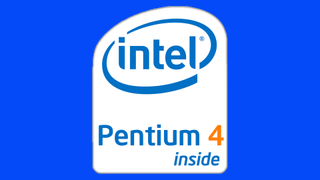Intel wins half of an ancient $1 billion antitrust case dating back to ye olde Pentium 4
But Chipzilla still owes the EU 376 million euros for doing the bad things.

For once some good news for beleaguered chip giant, Intel. The EU Court of Justice has upheld Intel's partially successful appeal against a very old antitrust case dating back to the early 2000s. So now Intel only owes the EU about $350 million, instead of over $1 billion. Huzzah!
In 2022, and in response to an appeal by Intel, the EU General Court ruled that part of an earlier 2009 decision against Intel should be overturned. The European Commission then appealed that, er, partially successful appeal by Intel against the 2009 decision. And now the highest court in the EU has upheld the 2022 decision.
In other words, that part is now a done deal and can't be re-appealed (okay, that's not an actual word). But what part of which decision, exactly? The short version goes something like this.
In 2009, the European Commission found that Intel had been up to two dodgy practices in the very early 2000s. This was around the time that Intel was chasing gigahertz with the Pentium 4 Netburst chip and AMD was having some early success beating Intel on pure performance with CPUs like the Athlon Thunderbird and then Athlon 64.
First, the EU found that Intel was paying partially or wholly hidden rebates to PC builders on the proviso that they sourced all, or nearly all of their CPUs from Intel. Second, Intel paid PC builders to delay or cancel the launch of particular PC models based on CPUs made by arch rival AMD.
The now conclusively upheld 2022 decision pertains to the first malpractice, the hidden rebates. That means, as things stand, Intel is still guilty of paying PC builders to ditch AMD-based PC models. And that's why Intel still owes some of the original $1 billion-plus fine.

Best CPU for gaming: The top chips from Intel and AMD.
Best gaming motherboard: The right boards.
Best graphics card: Your perfect pixel-pusher awaits.
Best SSD for gaming: Get into the game ahead of the rest.
For now, it's not clear if Intel will appeal the remaining circa $350 million and the accusations that go along with it. A statement from the EU seems to imply that it at least thinks the remaining fine will stick.
The biggest gaming news, reviews and hardware deals
Keep up to date with the most important stories and the best deals, as picked by the PC Gamer team.
"The Commission appealed the part of the 2022 judgment of the General Court concerning Intel's conditional rebates. Therefore, today's judgment concerns only those. On the other hand, given that the part of the 2022 General Court judgment concerning the naked restrictions has not been appealed by Intel, it has become final."
But The Register claims that Intel is indeed appealing the remaining penalty. Given this case has already been running 15 years and racked up goodness knows how much in lawyers fees, why not let it roll on with yet another appeal. Watch this space for more, in other words.

Jeremy has been writing about technology and PCs since the 90nm Netburst era (Google it!) and enjoys nothing more than a serious dissertation on the finer points of monitor input lag and overshoot followed by a forensic examination of advanced lithography. Or maybe he just likes machines that go “ping!” He also has a thing for tennis and cars.
Most Popular







